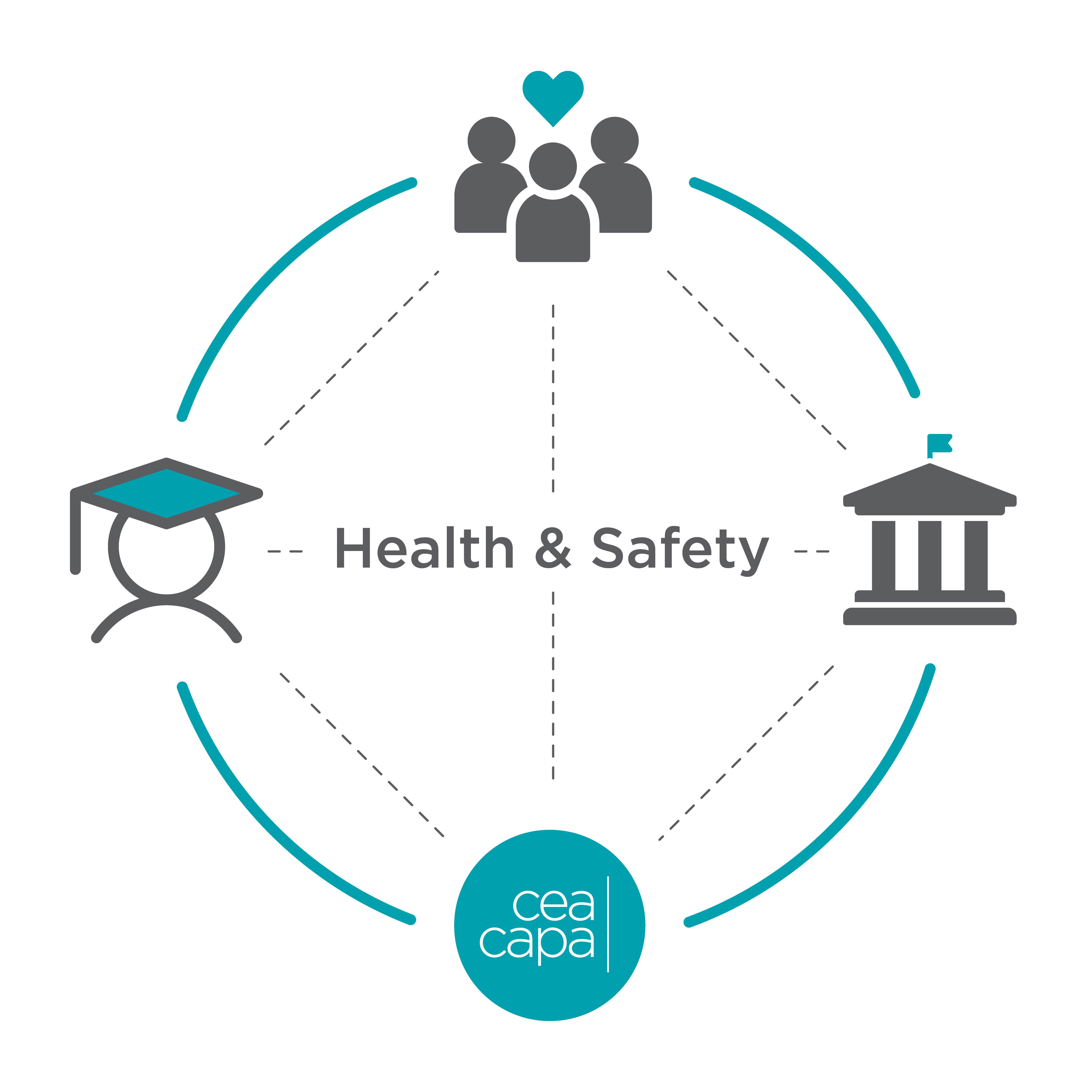Health, Safety & Security Abroad


CEA CAPA's Health and Safety Philosophy
At CEA CAPA, we believe that health and safety are a shared priority, and we strive to empower participants, their support networks, and their home institutions to contribute to this goal every step of the way. CEA CAPA puts extraordinary emphasis on safety and well-being of program participants abroad and actively engages with each stakeholder through the methods described below to provide informative preparation, ongoing support, and effective incident management.
Student Advising and Support
Pre-departure advising
All CEA CAPA participants are required to complete the Health Information form as part of their pre-departure requirements. While disclosure is not mandatory, participants are encouraged to be as transparent as they are comfortable with about their health and wellness needs in order to receive the most robust support from CEA CAPA. The Health and Safety Team reviews forms on a rolling basis and follows up with students who disclose health needs, or express that they would like more information about managing their physical or mental health abroad.
In certain cases, the Health and Safety Team may request a pre-departure advising call to gather additional details about disclosed health information. If a participant has recently experienced a medical event or is undergoing treatment for a health condition, documentation from their doctor or therapist may be required. Additionally, participants with health conditions may require advance arrangement of medical appointments or counseling sessions. The Health and Safety Team are available to participants throughout pre-departure to advise on this process and coordinate support.
Pre-departure resources and orientations
CEA CAPA's U.S.-based teams engage with participants throughout the pre-departure process via email, the student portal, and orientation sessions. Each participant is invited to a site-specific pre-departure orientation, where health and safety topics are reviewed. Additionally, participants are required to review the CEA CAPA Education Abroad Policies and sign the Participation Agreement, which outline essential safety and liability guidelines for all CEA CAPA programs.
To further support participants, the Health and Safety Handbook, available in the student portal, provides a comprehensive overview of pre-departure health and safety advising. Participants are encouraged to share these resources with their support networks.
To extend support beyond participants, the CEA CAPA Health and Safety team hosts a "Know Before They Go" pre-departure webinar for support networks and emergency contacts. Held each term, this live session offers a high-level overview of CEA CAPA’s emergency protocols, pre-departure advising, and risk management strategies. It also provides an opportunity for participants' support networks to ask health and safety-related questions before departure.
Onsite support to participants
Each CEA CAPA location is staffed with a dedicated onsite team that plays a central role in supporting participants throughout their experience. Many of our onsite team members have been with CEA CAPA for years and have extensive experience supporting American college students. The size of each team varies depending on the number of students enrolled at the site, ensuring that adequate support is provided based on local demand. These teams are available in person during regular business hours to offer guidance, answer questions, and assist with a wide range of academic, cultural, and logistical matters. In addition to this daily support, all participants also have access to a 24/7 emergency phone line. This line is monitored on a rotating basis by members of the onsite team, allowing students to receive immediate assistance for urgent concerns at any time. This support structure is designed to promote student well-being, safety, and success throughout their time abroad.
Every CEA CAPA program begins with an onsite orientation, which covers local health and safety guidelines. Throughout the term, onsite teams regularly assist participants with scheduling medical appointments or therapy sessions, resolving roommate conflicts, replacing lost items, refilling prescriptions, and more. They also offer guidance on academic success, interpersonal relationships, and making the most of the study abroad experience.
While many onsite team members have extensive experience working with undergraduate students, CEA CAPA does not employ mental health or medical professionals. However, our teams can help connect participants with the appropriate local resources to support their needs abroad.
CEA CAPA Health and Safety Team
CEA CAPA's Health and Safety team consists of four full-time staff members. Collectively, the team brings 30 years of professional experience in international education and remains actively engaged in the field of international safety and security within higher education. The team works cross-departmentally to train staff, support onsite team members, enforce organizational policy, monitor and mitigate risks, lead emergency response efforts, communicate with emergency contacts and institutional partners, and provide support for program participants both during pre-departure and onsite.
If you are interested in meeting with a member of the CEA CAPA Health and Safety Team, contact your Institutional Relations Representative to schedule an appointment. Click here to read more information on our Health and Safety Team.
Risk Management
Emergency and Crisis Response Framework
CEA CAPA has developed a comprehensive Emergency and Crisis Response Framework (ECRF) to establish clear and effective protocols for team members, enabling them to proactively prepare for and respond to a wide range of emergencies and crises. This detailed framework outlines specific roles, responsibilities, and step-by-step actions to be taken during various types of critical situations, ensuring a coordinated and swift response to protect both personnel, participants and organizational assets. The ECRF is readily accessible to all internal teams, and regular training sessions are held to ensure that staff are not only familiar with the framework but also well-equipped to apply this guidance effectively in incidents experienced by CEA CAPA students abroad.
International travel and health insurance
All participants on CEA CAPA programs, including visiting Program Leaders, are required to have coverage under an international travel and health insurance plan administered by Cultural Insurance Services International (CISI). Students and faculty are enrolled in the plan a few weeks prior to the start of their program, and no action is needed by the participant or their home institution. Coverage is in effect from the official program start date to the program end date.
The CISI policy is a reimbursement-style plan that provides coverage for a wide variety of medical, mental healthcare, emergency and travel assistance needs. Participants will typically pay for medical services up-front, then file a claim with CISI by providing copies of the receipts for treatment or medications received. CISI insurance does not cover the maintenance of pre-existing physical conditions or any treatment of congenital conditions. Coverage can be extended up to 30 days before or after the program dates at the participant's expense.
Mental health resources
Recognizing the increasing prevalence of mental health concerns among U.S. college students, CEA CAPA offers robust mental health support, including:
- Individualized pre-departure advising to help students prepare for mental healthcare abroad as well as how to travel with prescriptions.
- Connections to local counselors and therapists in program locations, as well as a network of online mental health providers.
- 24/7 emergency mental health support through insurance and emergency assistance providers.
Security intelligence
CEA CAPA's Health and Safety team continuously monitors global events that may impact program locations, ensuring proactive risk assessment and response. The team leverages multiple security networks, including PULSE International, the Overseas Security Advisory Council (OSAC), U.S. and international government resources, local security networks and a private security company to evaluate program sites, monitor ongoing current events, and review alerts of the latest issues occurring in program locations. In the event of an incident impacting the security of a CEA CAPA program location, these networks would be utilized by the Crisis Management Team to inform proper next steps.
Emergency Response
Emergency communication plan
Effective and timely communication is essential during a crisis or emergency situation. CEA CAPA utilizes a comprehensive plan to communicate with program participants, their home institutions, and emergency contacts.
With participants:
- All CEA CAPA participants are automatically registered in our emergency communication system. During orientation they are strongly encouraged to download the mobile application in order to utilize all available features, including travel registration and access to local emergency numbers. During an emergency or crisis situation, CEA CAPA staff utilize the app to communicate with participants in the impacted location. Communication may be sent via in-app message, SMS, email, and/or voicemail. The app also allows participants to “check in”, by either marking themselves safe or indicating that they are in need of assistance. Non-urgent communication with participants may be sent via email by the local onsite team. These messages are meant to inform or provide general guidance for minor events and do not require a response from the participants.
With a participant's home institution:
- The CEA CAPA Health and Safety team notifies home institutions of health and safety related incidents that may impact a student’s participation on the program as well as emergencies. Please keep your Institutional Relations Director informed of the appropriate emergency contacts at your institution to receive these updates. For incidents that impact a large group of participants or an entire program location, communication will be sent via email by CEA CAPA to all relevant institutional partners.
With a participant's emergency contact(s):
- In most scenarios, CEA CAPA teams seek to communicate directly with participants, most of whom are adults. In the event of a health or safety incident, CEA CAPA staff may request that a program participant provide written authorization to staff to speak with their emergency contact about their health and wellbeing. However, we will communicate with program participants' emergency contacts if the participant is unconscious, of unsound mind, or a danger to themselves or others. For incidents that impact a large group of participants or an entire program location, communication will be sent via email by CEA CAPA to all relevant emergency contacts.
CEA CAPA Crisis Management Team
The composition of the Crisis Management Team (CMT) is intentionally designed to represent various CEA CAPA stakeholders and include a diverse range of skill sets. This allows the team to effectively manage both isolated incidents and large-scale global emergencies. The CMT operates 24/7 and can be activated at any moment. Its primary function is to coordinate an effective and timely response across multiple areas, including participant support, emergency logistics, external communications, insurance, and more.
When mobilized, the CMT is organized into two groups: One consisting of Global Support Office team members overseeing the overall response and another onsite in the impacted location to manage the incident response directly.
The CMT meets regularly and engages in continuous training to prepare for incidents that may occur in any of our locations. Roles and responsibilities are clearly established with designated backups to maintain adequate coverage, and a thorough Emergency and Crisis Response Framework provides suggested guidelines to effectively manage the crisis response.
Sexual misconduct
CEA CAPA works closely with onsite teams and partner institutions to respond to and report any sexual misconduct incidents impacting a program participant. Information regarding sexual misconduct incidents is kept private, and details are shared internally with designated CEA CAPA staff on an as-needed basis to ensure appropriate actions and support are taken. We are committed to providing timely and sensitive support to all participants involved in such incidents, and we work to ensure that any necessary resources, such as counseling, health or legal services, are made available to affected participants. Our Health and Safety team will reach out to your institution’s study abroad office to inquire about your designated Title IX officer and coordinate efforts for support and follow-up.
How to report to CEA CAPA
Partner institutions may contact CEA CAPA 24/7 to report an incident, concern or health and safety emergency by calling (800) 266-4441 to speak with a US team member. If a CEA CAPA participant from your institution contacts you to report an emergency, please encourage them to contact their onsite emergency phone number for their program location. Participants receive this number during their onsite orientation.










